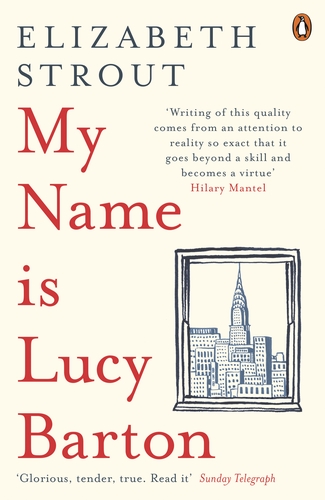What a beautiful edition of Elizabeth Strout´s My Name is Lucy Barton we got a hold of!
The edition by Penguin Books (2016) gives you a scene from Lucy’s point of view: a view is from her hospital bed where she is lying. From her window, we can see the tower of the Chrysler building from a distance. When you turn this cover page and open the first page, a simple, stylish drawing from New York building opens up before your eyes. The beauty of the book lies in small details like this one!
Lucy has ended up in the hospital for nine weeks, of which her mother accompanies her for the first five days. It is not her husband, nor her children, but her mother who sits beside her bed, be it night or day. Mother is present, solely available for Lucy, something which Lucy has never experienced before. “Wizzle”, as her mom calls her, affectionately. “All I want is this”, hopes Lucy.
Lucy Barton could be described as a story of a woman who has been succeeding in a pursuit of an American dream; a somewhat broken childhood from poor family from Illinois has changed into a prosperous family life with a husband and children who live in West Village, a fancy part of Manhattan. However, her past does not seem to be in the past, or as we come to learn, through conversations with mother we can see that the broken relationships in the past have left some marks on Lucy. What are they? What is it in her past that makes her mother to stay by her bed side, and what happens when she leaves the hospital?
Strout’s way of writing is something unique which elevates the narration to its own unique level. Even though comparisons might not be relevant, one cannot help thinking about the author, Rachel Cusk whom we have read before in our book. The tone and the pace of the stories, and the sharp observations of the surroundings/events with some floating feeling seem to unite these two narrators. What happens in the story is not so important in itself but how the things are observed and told.
“I need you to leave”, is a request we hear later on in the story. These kinds of short comments also carry so much weight in them. They leave reader to sink into the story, a feeling that will stay with you for some time after the finishing of the book.
Review of our group: 3,4/5 stars!
-Marika
Image: https://www.penguin.co.uk/

